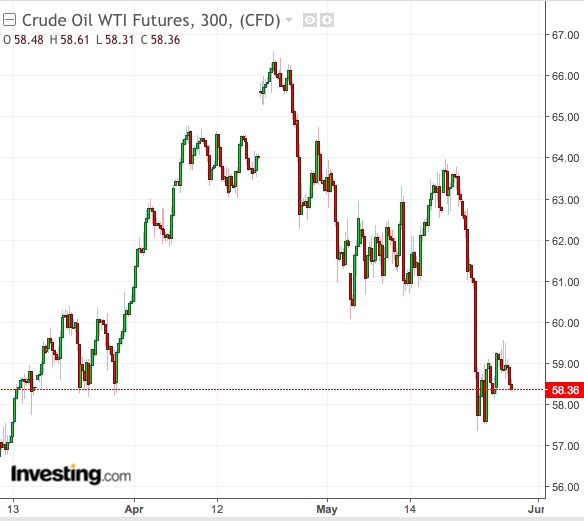Like anyone else, Donald Trump has choice expressions whenever he speaks excitedly of something. Those who’ve heard and seen the U.S. President regularly enough on the news and Twitter will find “really”, “truly” and “badly” quite indispensable to his vocabulary, especially when he’s talking about things like “making a deal quickly”.
This linguistic preference of Trump was on display again on Tuesday when he insisted that what he wanted of Iran, really, was not regime change but a country without nuclear weapons, which he was ready to talk with. “I really believe that Iran would like to make a deal,” he began at a news conference during his visit to Japan, before adding: “I think that’s very smart of them, and I think that’s a possibility to happen.”
That Iran itself has no wish to achieve such a thing with Trump seems to be of lesser significance for now.
Within hours of the president’s remarks, newspapers and opinion columns were roasting him for undermining his National Security Advisor John Bolton’s well-known wish for regime change in Iran.
Adding to the incredulity of Trump’s volte-face on Iran was his inaccurate assertion that North Korea’s latest missile test did not violate U.N. resolutions, again in defiance of Bolton.
Flip-Flop On Iran Will Be Felt In Oil More Than Anywhere
While Trump’s flip-flop on Iran is certainly a worry for the larger world, nowhere will this new crisis of confidence on his policy-making be felt more than in the oil market.

That’s because the so-called geopolitical premium arising from the Middle East tensions that have given oil much of its strength over the last two months rides on the U.S.-Iran conflict and the block placed by the Trump administration on the Islamic Republic’s oil exports.
Aside from OPEC production cuts and U.S. sanctions against Venezuelan oil, the Iranian situation provides the single most important support for oil now, especially with the worsening U.S.-China trade war spawning fears of pain for the global economy. Without adequate world demand for oil, squeezing supply is about the only way to maintain the market’s “equilibrium”—OPEC’s language for higher prices.
If all the U.S. president wants is the assurance that Iran isn’t making atomic weapons or enriching uranium—and the Rouhani administration says it isn’t, though it will not give Trump the satisfaction of a summit to prove that—then there may not be much reason to sanction Iran. After all, that was what the Joint Comprehensive Plan of Action—President Barack Obama’s signature foreign policy accomplishment on Iran, which Trump tore up on entering office—was all about.
Temporary Sanctions Relief Nightmare For Bulls
If Trump suggests even temporary relief for Iranian oil exports to coax Tehran to the negotiation table, it could be a nightmare for oil bulls given the price crash likely to follow in both the U.S. West Texas Intermediate and U.K.Brent benchmarks—regardless of the current Saudi-enforced OPEC cuts. In such an environment, the Saudis may have just boxed themselves into a situation of indefinite supply cuts to prevent deeper losses—especially with Russia, their top ally thus far on market support, unwilling to curb crude exports for too long.
While many media headlines struggle to make sense of Trump’s new softly-softly approach to Iran—a country he had threatened with military action just weeks ago—to us at Investing.com, it comes as no surprise.
As early as April 5, we wrote that Trump may offer Iran the option of talks if it wishes to avert further economic crisis from its nuclear program.
Few Things Matter More To Trump Than Low Oil Prices
Our belief is that few things matter more to the president than keeping oil prices as low as possible until he clears his bid for reelection in November 2020. That’s a long way to go, but he’s going to try—that’s our conviction.
It could also be one reason why Trump isn’t doing a deal with China right away. A U.S.-China trade agreement could give oil an incredible boost, given the purchases of U.S. crude on tap from Beijing once the signings are done. Oil prices crashed as much as 7% last week as U.S.-China trade hostilities increased in the absence of a deal.
As our earlier article suggested, the mere notion of a U.S.-Iran Nuclear Agreement 2.0 that would let Tehran export its crude with freedom again, albeit with some restrictions, could drive the flat price of oil down $5 a barrel or more.
Even then, we outlined reasons why such a deal may not happen. The negatives included Iranian President Hassan Rouhani’s displeasure with Trump compared to his predecessor Obama, and also protests from Israel. Central to U.S. Middle East policy has been its historic relationship with Saudi Arabia and Israel to balance Iran’s regional ambitions. All those reasons remain.
Yet, Trump being Trump, he could propose talks with Iran just to pull the market lower.
No one expected the president to sit with Kim Jong-un within a year of trading barbs with him, although the summit with the North Korean leader hasn’t gotten Washington anywhere near its objective of nuclear disarmament for Pyongyang. For better record, Trump has made the Chinese play ball with him on trade talks so far.
While the Iranians appear outraged now by Trump’s suggestion for talks, even batting away Japan’s offer to mediate, Foreign Minister Javad Zarif has, nevertheless, asked the president to prove his intentions “through actions, not words”.
For a president bent on getting oil prices lower, a temporary sanctions reprieve could be seen as one way of placating the Iranians. And economic necessity could ultimately force the Iranians to the table—just like in 2015. And Trump can always re-impose sanctions, just as he added tariffs on China, if the talks don’t go as he likes.
